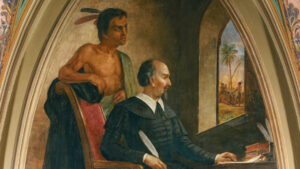Hall of Fame
Bartolomé de las Casas
1484 – 1566
Inducted 2020

Bartolomé de las Casas came to Haiti as a young conquistador from Spain. He actually knew Columbus and was one of many young Spaniards who was given or “commended” a village, to do what he wanted with. Moved by a Dominican friar, Antonio de Montesinos, who demanded to know “By what right or justice do you keep these Indians in such a cruel and horrible servitude?” Las Casas had no answer. So he renounced his encomienda, refusing to make money off the unrequited labor of others. He experimented with alternative ways to organize economic enterprises in the Americas and eventually got the king of Spain to appoint him “Defender of the Indians.” He then spent most of his long life in the Caribbean, working for their better treatment.
Las Casas came to be the first great historian of the Americas (the Spanish having destroyed any works by Mayan historians). When other historians overlooked or defended the Indian slave trade, begun by Columbus, Las Casas said starkly: “What we committed in the Indies stands out among the most unpardonable offenses ever committed against God and mankind, and this trade as one of the most unjust, evil, and cruel among them.” 1Las Casas,History of the Indies, (New York: Harper and Row, 1971), 289. Of the encomiendas practice, he wrote:
In this time, the greatest outrages and slaughterings of people were perpetrated, whole villages being depopulated…. The Indians saw that without any offence on their part they were despoiled of their kingdoms, their lands and liberties, and of their lives, their wives, and homes.2Las Casas quoted in Kirkpatrick Sale, The Conquest of Paradise (NY: Knopf, 1990), 159.
At one point Las Casas suggested importing enslaved Africans, rather than continuing to enslave the Indians, who perished under the harsh regimen. Some people rightly condemn him for that. But he recanted almost immediately and writing about himself in the third person, condemned himself for his lapse:
This advice to give a license for the bringing of black slaves to those lands was first given by the priest Casas, who was unaware of the injustice with which the Portuguese take them and make slaves of them. Later, after falling into this snare, he regretted it, and would not have given that advice for all the world, for he always believed they were enslaved unjustly and tyrannically, because they have the same right to freedom as the Indians.
Las Casas went on to write that he prayed to God to have mercy upon his soul for this error, “but he does not know if God will do so.”3Las Casas quoted in Marcel Bataillon, “The Clerigo Casas,” in Juan Friede and Benjamin Keen, Bartolomé de las Casas in History(DeKalb: NIU Press, 1971), 415-6. Since none of us is perfect, surely we must forgive him this lapse.
In 1542, Las Casas (and others) prevailed upon the king of Spain to issue New Laws governing Spain’s colonies in Latin America, laws ending slavery and gradually ending the encomienda system. For several years, Spain renounced slavery and published humane regulations, which almost led to colonial revolt. At length the regulations were forgotten, and Spain wound up among the last European powers to give up slavery.
Nine years later, Las Casas took the affirmative in one of the most important trials ever to take place on the planet Earth. Held at Valladolid, Spain, the issue was: Are Indians human beings? Bishop Sepulveda and historians Oviedo, Cuneo, Gómara, and Garcilaso de la Vega, among others, argued they are some subordinate species, appropriate for slavery. “Indians are born lazy, idle, melancholy and cowardly, vile and ill-natured, liars, with a short memory and no perseverance,” claimed Oviedo. Las Casas countered by emphasizing their many positive human attributes:
They used their leisure — which was considerable since their souls did not burn with greed for wealth and estates — in honest recreation such as certain strenuous ball games, dances, and songs that were recitations of their historical past. They also made very beautiful objects with their hands when they were not occupied with agricultural, fishing, or domestic chores.4Las Casas, History of the Indies, (New York: Harper and Row, 1971), 277-78.
Most important, Las Casas pointed out that Indians were thinking beings, like anyone else: “All the peoples of the world are men, and there is only one definition of each and every man, and that is that he is rational.”5Las Casas quoted in J. H. Elliott, The Old World and the New (Cambridge: Cambridge UP, 1970), 48.
Again, Las Casas more or less won, but the victory was again only temporary. Nevertheless, centuries after his death Las Casas was still influencing history. Simon Bolivar used his writings to justify the revolutions between 1810 and 1830 that freed Latin America from Spanish domination. Even today, Las Casas lives. Today, movements for human and economic rights for indigenous peoples across Latin America invoke his name. Three statues stand in front of the main museum of the Dominican Republic, “The Museum of the Dominican Man,” representing the three groups who made D.R. history: African, Indigenous, and European. Las Casas is the European chosen to represent Europeans.
In the United States, however, we only learn Columbus and other oppressors of the “Indians,” like Cortez, Pizarro, and Hernando De Soto. Not one American in a hundred knows Bartolomé de las Casas and what he did.